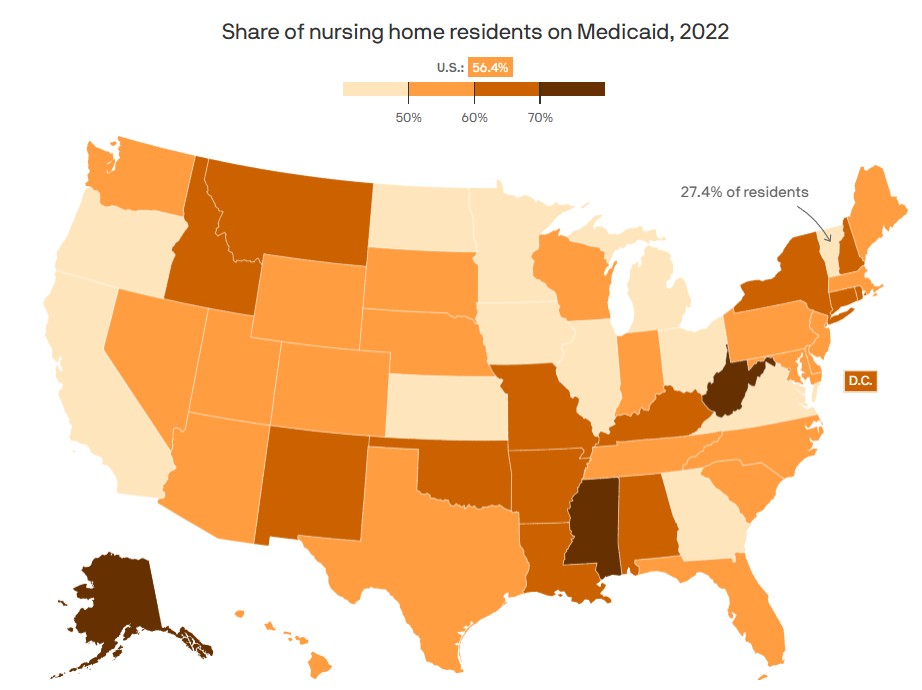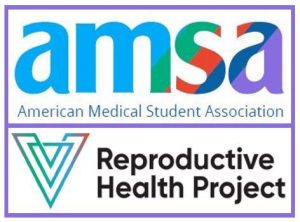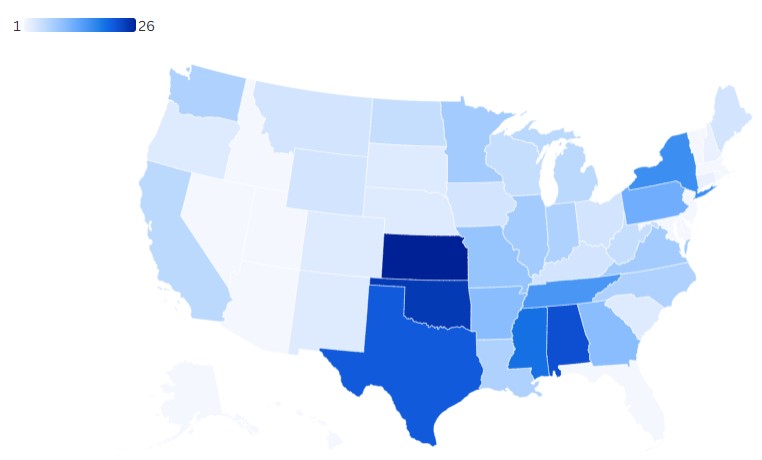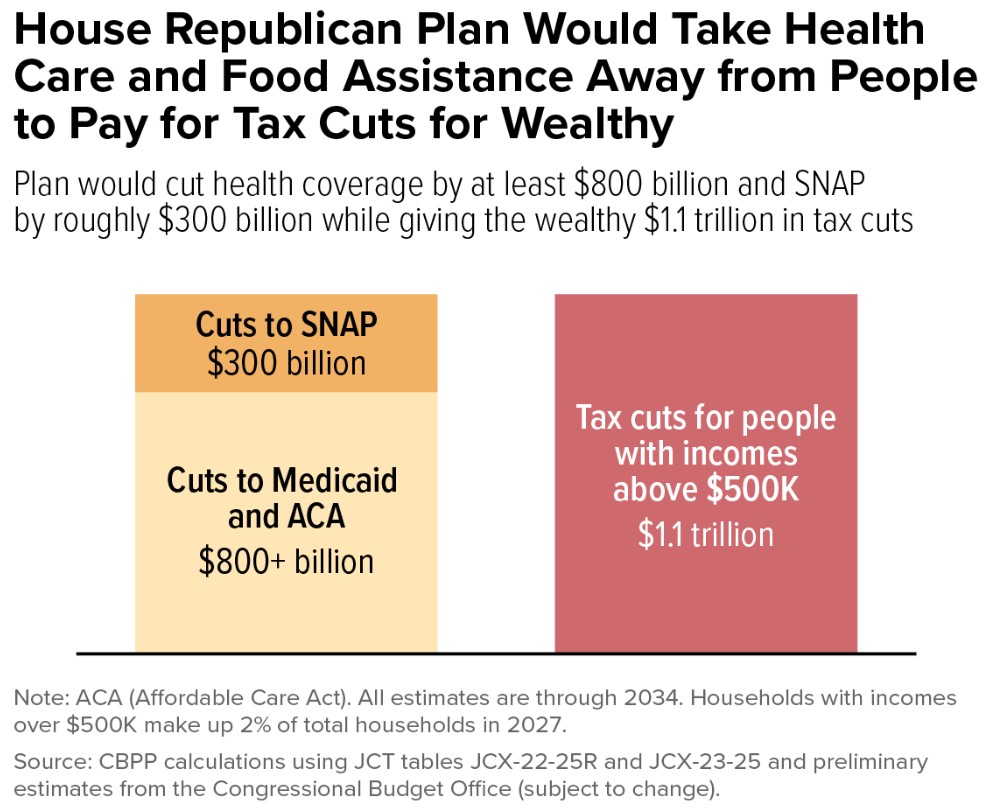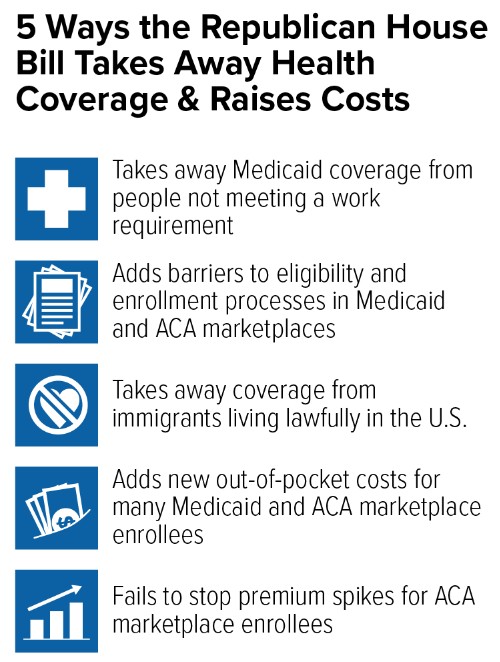
“The House has passed a reconciliation bill that would take health coverage away from millions of people and dramatically raise health care costs for millions more.
Roughly 15 million people by 2034 would lose health coverage and become uninsured because of the Medicaid cuts, the bill’s failure to extend enhanced premium tax credits for Affordable Care Act (ACA) marketplace coverage, and other harmful ACA marketplace changes, according to estimates from the Congressional Budget Office (CBO). This figure could well rise to account for last-minute changes in the House that made the bill harsher.”
-CBO estimates project that 7.6 million people would become uninsured due to Medicaid policies passed by the Energy and Commerce Committee (E&C).
-1.8 million people would become uninsured due to codification of the Trump Administration marketplace rule provisions, which the E&C Committee also passed.
-2.1 million people would become uninsured because of marketplace policies passed by the Ways and Means Committee.
-An additional 4.2 million people would lose marketplace coverage because the legislation fails to extend the premium tax credit enhancements.
Link to Learn More – Center on Budget and Policy Priorities
Medicaid Has Many State Names
Scroll Down to Find Out What Medicaid is Called in YOUR State
Our thanks to Wendell Potter & Joey Rettino at Health Care un-covered for compiling & sharing this list – Learn more here
Alabama: Alabama Medicaid (no rebrand)
Alaska: DenaliCare (formerly Alaska Medicaid)
Arizona: Arizona Health Care Cost Containment System (AHCCCS)
Arkansas: Arkansas Medicaid (no rebrand; “Arkansas Works” was used for expansion but is no longer active)
California: Medi-Cal (distinct state branding)
Colorado: Health First Colorado (distinct state branding)
Connecticut: HUSKY Health (HUSKY A, B, C, and D are Medicaid/CHIP programs)
Delaware: Delaware Medicaid (no rebrand)
Florida: Florida Medicaid (no major rebrand, but the program, administered by private insurers, is called the “Florida Medicaid Managed Medical Assistance Program”)
Georgia: Georgia Medicaid (managed care program branded as “Georgia Families”)
Hawaii: Med-QUEST (distinct state branding)
Idaho: Idaho Medicaid (no rebrand)
Illinois: Illinois Medicaid (managed care program called “HealthChoice Illinois”)
Indiana: Hoosier Healthwise (for children and pregnant women) and Healthy Indiana Plan (HIP) (for adults)
Iowa: IA Health Link (managed care program branding)
Kansas: KanCare (distinct state branding)
Kentucky: Kentucky Medicaid (managed care; an attempt was made to rebrand it as “Kentucky HEALTH” but it was blocked)
Louisiana: Healthy Louisiana (distinct managed care branding)
Maine: MaineCare (distinct state branding)
Maryland: Maryland Medicaid (managed care program called “HealthChoice”)
Massachusetts: MassHealth (distinct state branding)
Michigan: Michigan Medicaid (expansion population covered under “Healthy Michigan Plan”)
Minnesota: Medical Assistance (MA) (official term; no separate brand)
Mississippi: Mississippi Medicaid (no rebrand)
Missouri: MO HealthNet (distinct state branding)
Montana: Montana Medicaid (no rebrand; Medicaid expansion called “HELP Plan”)
Nebraska: Nebraska Medicaid (managed care program called “Heritage Health”)
Nevada: Nevada Medicaid (no major rebrand; CHIP is called “Nevada Check Up”)
New Hampshire: New Hampshire Medicaid (expansion population previously under “NH Health Protection Program”)
New Jersey: NJ FamilyCare (distinct state branding)
New Mexico: Centennial Care (distinct state branding)
New York: New York State Medicaid (managed care under “Mainstream Medicaid Managed Care”)
North Carolina: NC Medicaid (managed care launched as “NC Medicaid Managed Care” in 2021)
North Dakota: North Dakota Medicaid (no rebrand)
Ohio: Ohio Medicaid (no rebrand)
Oklahoma: SoonerCare (distinct state branding)
Oregon: Oregon Health Plan (OHP) (distinct state branding)
Pennsylvania: Pennsylvania Medicaid (managed care program called “HealthChoices”)
Rhode Island: Rhode Island Medicaid (expansion populations also branded under “Rhody Health Partners”)
South Carolina: Healthy Connections (distinct state branding)
South Dakota: South Dakota Medicaid (no rebrand)
Tennessee: TennCare (distinct state branding)
Texas: Texas Medicaid (no rebrand, but widespread managed care through various private plans)
Utah: Utah Medicaid (expansion branded temporarily as “Medicaid Expansion” or limited benefits under “Primary Care Network (PCN)”)
Vermont: Green Mountain Care (umbrella branding for Medicaid and other health programs)
Virginia: Virginia Medicaid (managed care for certain populations branded under “Commonwealth Coordinated Care Plus”)
Washington: Apple Health (distinct state branding)
West Virginia: West Virginia Medicaid (no rebrand)
Wisconsin: Wisconsin Medicaid (expansion program called “BadgerCare Plus”)
Wyoming: Wyoming Medicaid (no rebrand)
States Rely on Medicaid for Nursing Home Care
“Nursing homes across the country rely heavily on Medicaid, with the safety net program covering more than 6 in 10 residents in 18 states,
according to an analysis of federal data by Assisted Living Magazine shared exclusively with Axios.”
Learn More – AXIOS – 042925
